Research on keywords remains central to digital marketing and search engine optimization (SEO) plans. As corporate entities seek to triumph and find their niche in the market, reaching out to the appropriate demographic benefit with some effective keyword research tools.
In general, keywords are very important for any marketing and SEO campaign because keywords define the search terms used by users, so the business should use relevant keywords to create content.
Importance of Keyword Research
Keyword research is crucial for creating web content that is effective in achieving its goals, as well as optimizing the content for search engines to increase traffic to websites.
Definition: What is Keyword Research?
Keyword research is defined as the process that involves finding out the most suitable what or which phrases or words to include in a particular website.
Keyword research is an extraction and analysis of the words and phrases that users type into search engines when in search of a product or service, or even any piece of information. It includes identifying the relevant and popular keywords that PCs users search while in connection to a business.
Benefits of Keyword Research
It is always essential to have a clear understanding of some of the benefits that come with the right keyword research for any online marketing plan or campaign.
- First it allows businesses to know the kind of searches made by their target audience so that they may create material that caters for needs of the interests of the targeted members.
- Furthermore, keywords are needed to know the areas that are overlooked by the competition.
- It provides the business the opportunity to seize such opportunities thereby gaining a competitive benefit against rivals.
- Moreover, it has various uses in paid search advertising as it enables the advertisement funds to be invested in the right keywords.
The Impact on Content Strategy
Keyword research is one of the most critical elements while developing content strategy since it is the base. That is why, by analyzing keywords and phrases that are significant to the target consumers, companies can create content that the mentioned population would want to engage with.
Not only does this increase user participation, but it also makes the association more relevant and authoritative to the view of the search engines, which can result in optimum positioning in the organic searches.
Criteria for Choosing Keyword Research Tools
Choosing the best keyword research tool 2024 or service for your business involves several important aspects. These criteria will guide you toward selecting tools that meet your exact needs and are affordable enough to fit into your company’s marketing budget and overall Internet marketing plan.
1. Data Accuracy and Reliability:
To find the necessary materials, search for her options that would get the latest and most trustworthy data from the best and most reliable sources, like keywords and possible databases.
2. Keyword Suggestions and Ideation:
For it to be a good keyword research tool, it should be able to provide relevant options for the focused keywords, additional keywords that may also be important in the niche, and any other keywords that have yet to be explored.
3. Search Volume and Trend Analysis:
It is good always to consider search volume and trends when implementing keywords to know the level of impact it may cause.
4. Competitor Analysis:
Competitors’ keyword research might be done differently, so understanding these strategies can be an advantage. Applications that provide competitive analysis can act as a guide in helping you determine areas where you may lack or areas that can potentially be of benefit to you.
5. Integration and Compatibility:
For example, think about tools that are easily integrated with the current digital marketing toolkit, such as SEO platforms, content management systems, and analytics. This helps streamline normal working processes and achieve better organizational outcomes with the use of metrics.
10 Best Keywords Research Tools to Try in 2024
1. Google Keyword Planner
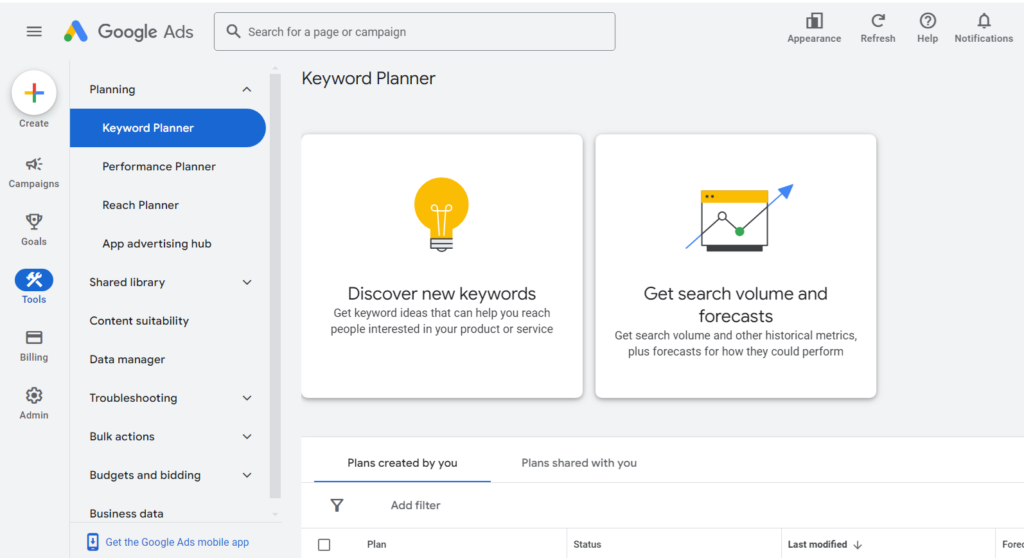
The Google Keyword Planner is a free tool that is part of Google AdWords, which is now referred to as Google Ads. It gives relevant information regarding the number of searches for a certain word or phrase, the level of competition from other advertisers, and the probable cost per click of certain terms or phrases.
Key Features:
- A wide list of identified keywords from Google search results
- This report provides a comprehensive analysis on search volume data and search volume forecasts.
- The keywords are essentially the suggestions and ideas for the content that will be used on one’s website.
- All the major ad networks integrate ad group and campaign management features into their ad platforms to assist marketers with their online ad campaigns.
Pros:
- Free to use
- Integrates directly with Google ads
- It gives data directly from Google’s search system
Cons:
- There is limited information available, especially for non advertisers who use traditional media in other ways apart from advertising.
- They never presented Competitors analysis or Ranking data
Website Link: https://ads.google.com/intl/en_in/home/tools/keyword-planner/
Price: Free
2. SEMrush
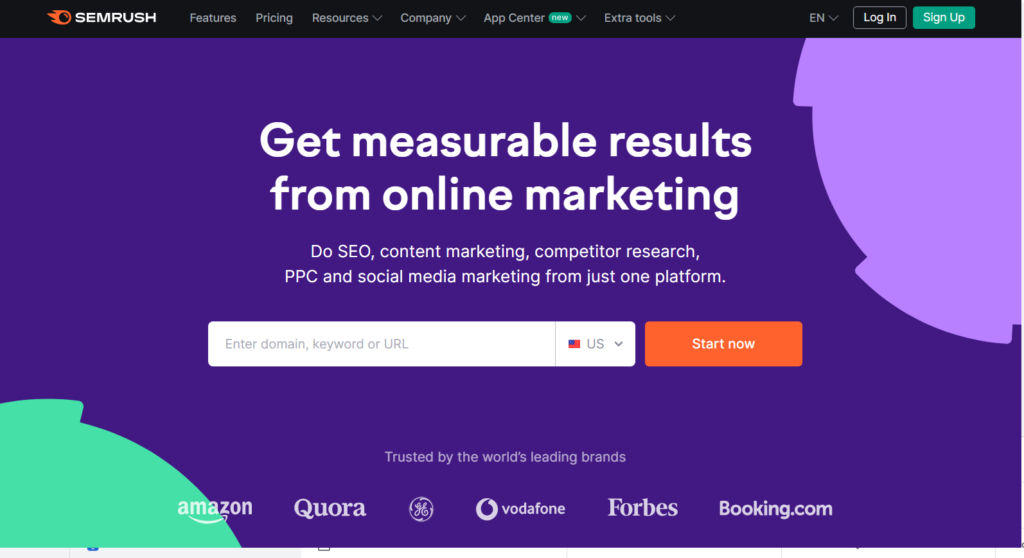
A powerful keyword research tool is integrated into SEMrush, making it a versatile set of tools for digital marketers. It also helps in knowing the number of searches, KD scores and info about the competitor.
Key Features:
- Keyword database is available with huge records for both global and local users.
- There are still key areas, such as the competitor analysis and keyword gap analysis.
- Keyword tracking and ranking check
Pros:
- It is reported that various specific and precise quantitative and qualitative statistical data are available.
- Comprehensive competitor analysis
- It is integrated with other tools that are offered by the SEMrush suite
Cons:
- It can also be slightly expensive for the individual or a small business which wants to make a gain in the business.
Website Link:https://www.semrush.com/features/keyword-research-toolkit/
Pricing: Starting: $129
3. Ahrefs
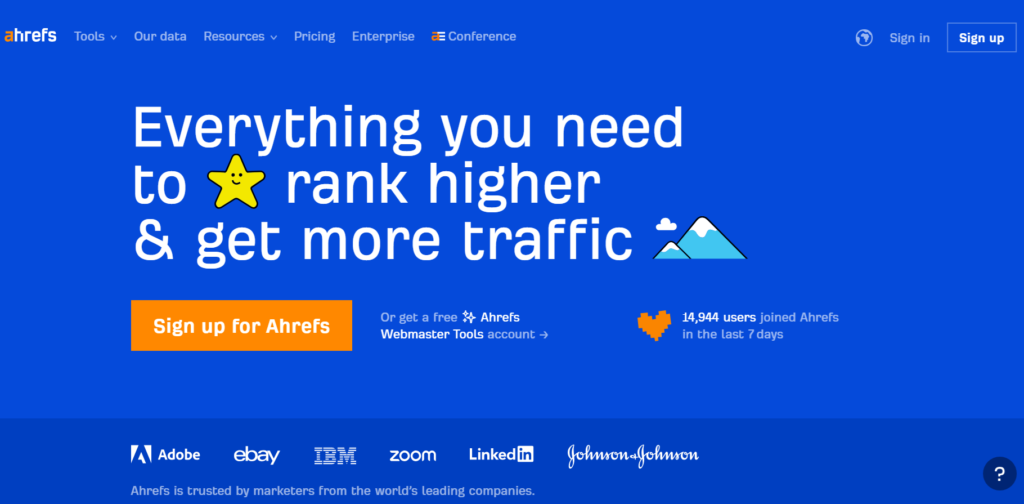
Ahrefs is a powerful SEO tool that provides the best keyword research tool. It offers detailed information about the search terms, keyword difficulty, and analysis of the competitors in the niche.
Key Features:
- A keyword database that contains over half a million items and covers many countries.
- Keyword difficulty and traffic potential metrics We shall use two important metrics while compiling the list
- Action on competitor analysis and backlink
- Keyword suggest and content audit
Pros:
- Intuitive and powerful analysis of competitors
- User-friendly interface
Cons:
- Costly for applicable for individual users or small retail manufacturers
- Restricted one month trial version and a free version.
Website: https://ahrefs.com/keyword-generator
Pricing: Starting: $129
4. Moz Keyword Explorer
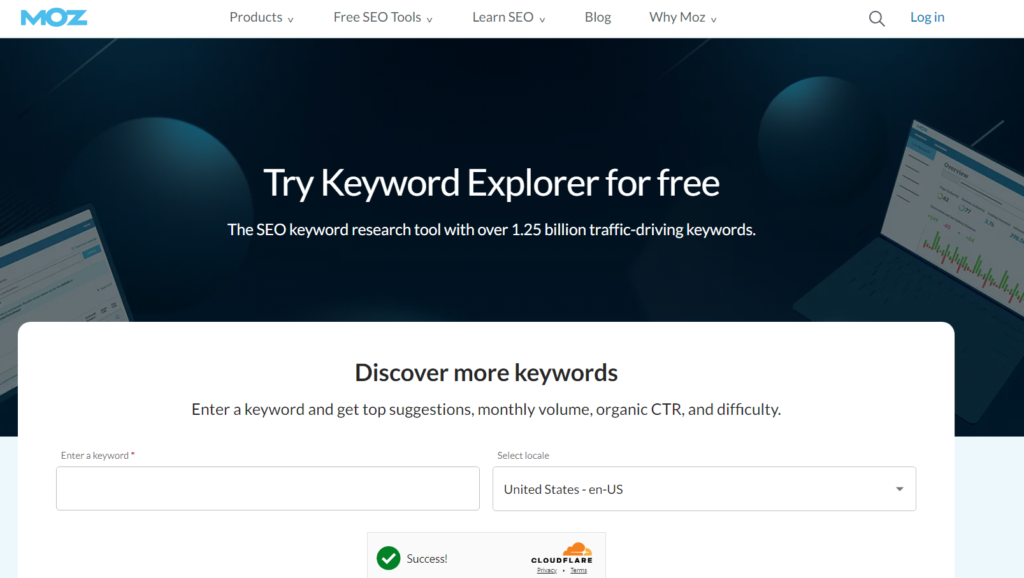
Moz Keyword Explorer is a tool that belongs to a group of tools called Moz SEO tools. It has quite a simple and intuitive user interface, letting the users make very important determinations on the traffic volume, the keyword difficulty, and the competitor analysis.
Key Features:
- Monthly search volume and average difficulty level
- It provides competitor analysis and a keyword gap analysis
- Monitoring of keywords and their importance
Pros:
- Affordable pricing plans
- Easy To Use interface
- It can work in conjunction with other Moz tools
Cons:
- The data can be less comprehensive in comparison with the data of some competitors.
- Free trial and free plan configurations are also restricted in this model.
Website: https://moz.com/explorer
Pricing: Free
5. Google Search Console
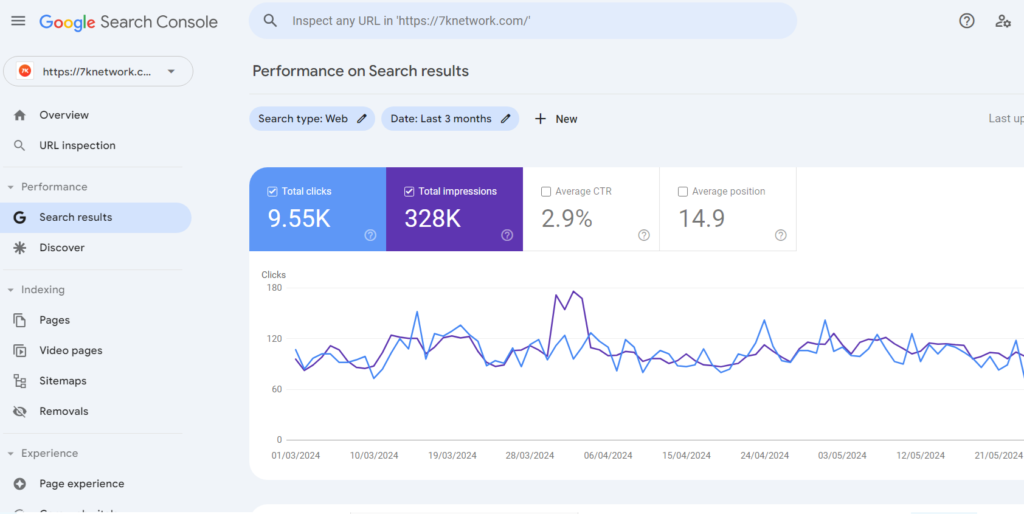
The Google Search Console, formerly known as the Google Webmaster tools, is another one of the search engine toolbar offered free for use by Google to the owners of websites so that they may be able to monitor the performance of the site in Google Search results.
Key Features:
- Understanding the impressions your website has made with regard to the keywords it is associated with
- Results pertaining to click through rates and impression
- Performance data on clickthrough rates and impressions
- These are some of the problems with indexing
- Integrating with the other service of Google such as analytics
Pros:
- Free to use
- It provides the correct information.
- Pinpoints various technical problems that impact search outcome
Cons:
- It provides limited data compared to some of the other paid keyword research tools.
- Keyword difficulty and analysis of competitors.
Website: https://search.google.com/search-console/about
Pricing: Free
6. Google Trends
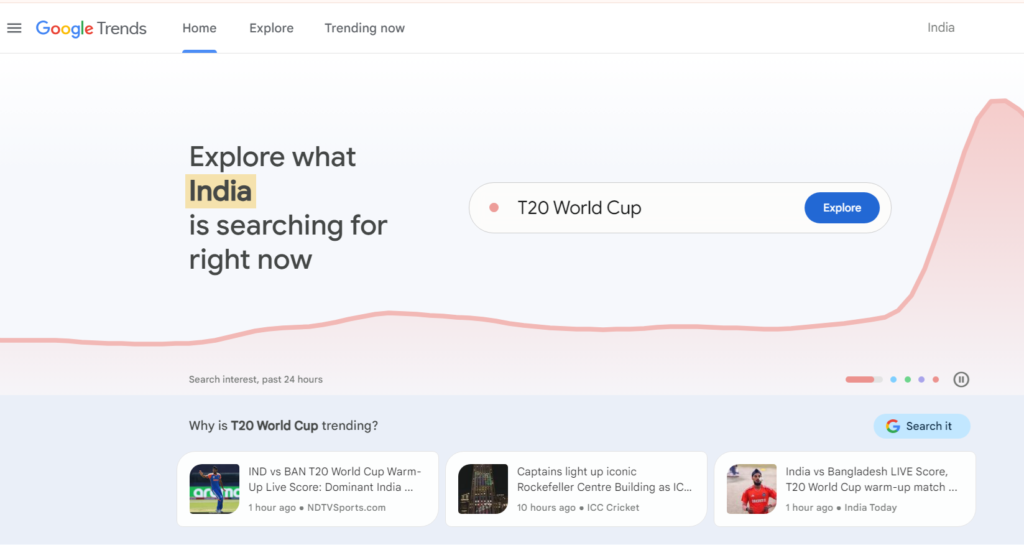
Google Trends is an online trend analysis tool for most searched words by a specific geographic area or time period, made available to users for free by Google.
Key Features:
- Search interest is characterized by the trends that show the development of interest in the world of internet users.
- Comparison of the Multiple Search terms
- Technological advances in the geographic analysis of search trends
Pros:
- Free to use
- It delves on shapes and trends when it comes to search trends
- Helpful in searching for specific themes that may be more relevant during one period of the year or in general
Cons:
- Little information about the search terms or other measures.
- There are no keyword suggestions whatsoever, and there is no competitor analysis section available.
Website: https://trends.google.com/trends/
Pricing: Free
7. Keywordtool. io
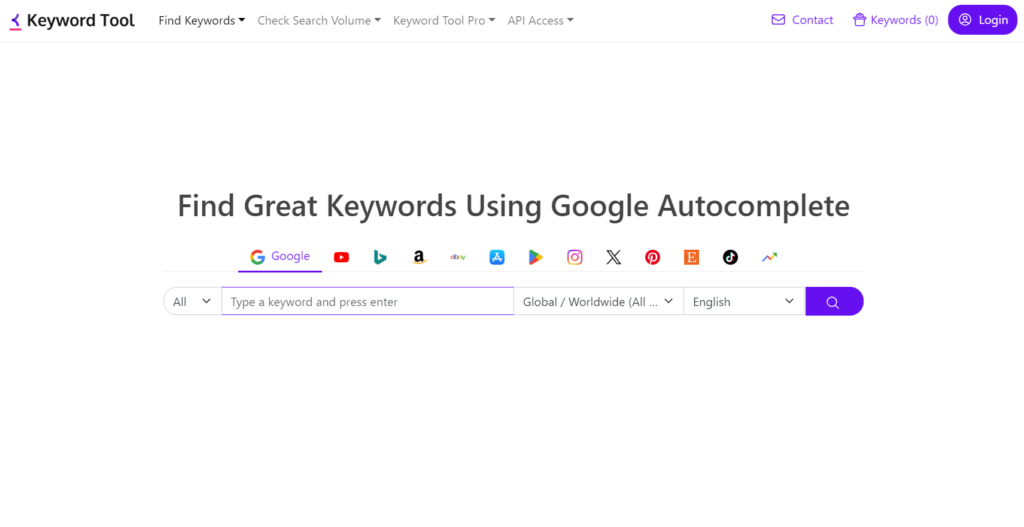
It is another free and powerful tool for the discovery of relevant keywords with various additional options.
Key Features:
- Recommendations in keywords and relevant terms
- Search volume data and trends are the most important.
- Difficulty and competition scores are measures of how difficult it was to complete a level and how well the competitor did as opposed to other competitors.
Pros:
- Affordable pricing plans
- User Friendly interface
- Access to extensive sets of tools for keywords and phrases identification
Cons:
- In comparison to some other advanced tools there is not much data available.
- Market share data, competitor analysis, or ranking information is also missing
Website https://keywordtool.io/
Pricing: Free
8. MarketMuse
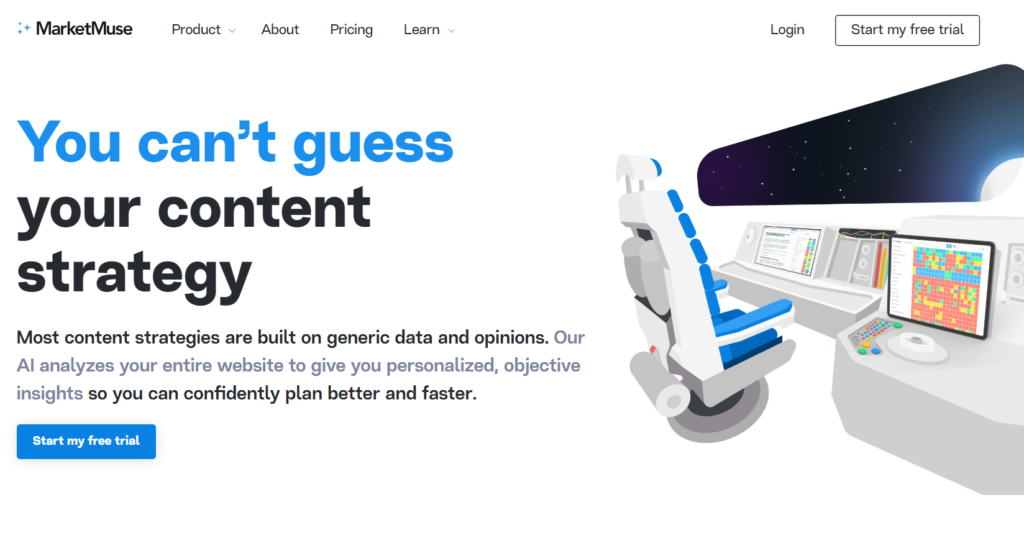
There is an AI content editing tools named MarketMuse, in particular, it has a powerful keyword research feature to make SEO focused content.
Key Features:
- This type of artificial intelligence is intended to help in identifying the relevant keywords and topics.
- In this manner, the necessary content gap analysis and competitive insights for the given keywords are provided.
- Grammar and article enhancement
- The analysis of keywords on the website and site performance assessment
Pros:
- AI enhancements to boost content management and optimization
- The first strategic factor includes comprehensive content planning and analysis.
- The best suited for making high quality, reputable content.
Cons:
- Potentially pricey for everyone else as compared to monthly or yearly subscriptions
- The tool is more helpful in optimizing content as it lacks some of the essential functions of keyword research.
Website: https://www.marketmuse.com/keyword-research/
Pricing: Starting: $149
9. GrowthBar SEO
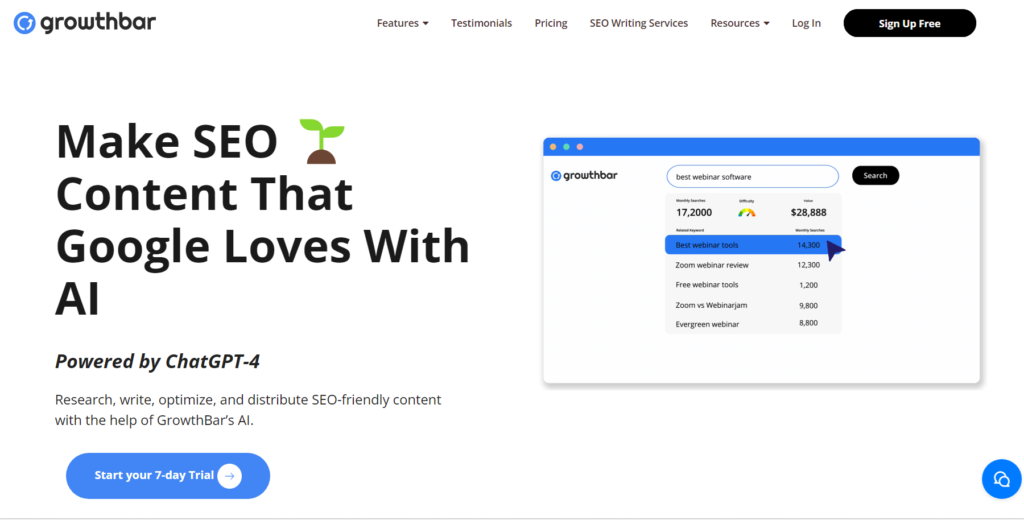
GrowthBar SEO is an SEO software that offers an extensive keyword research feature in addition to other SEO tools.
Key Features:
- A feature for getting keyword ideas and improving creativity
- Another set of metrics is that of search volume and keyword difficulty data.
- Knowledge about competitors and keyword search rival
- Rank tracking and performance monitoring
Pros:
- Affordable pricing plans
- All In One SEO solution
- Ideal Keyword & Competitor analysis
Cons:
- Less comprehensive than what is available in standalone keyword tools that cost more money.
- Minimum features
Website: https://www.growthbarseo.com/
Pricing: Starting: $36
10. KWFinder
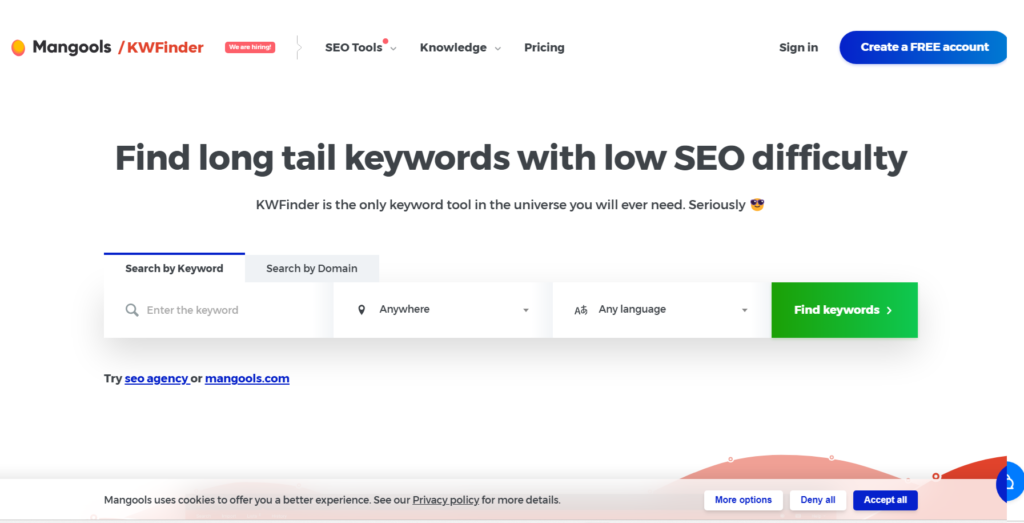
KWFinder is one of the most favorite keyword research tools for internet marketers that provides a lot of useful features for keyword search and evaluation.
Key Features:
- Keyword suggestions and longtail keyword generation are the two major concepts
- Specific keywords to optimize using search volume and keyword difficulty scores.
- Competitive analysis specifically looks into competition in the market by analyzing key words while SERP analysis looks at the ranking on search engine result pages.
- Keyword lists and organization tools
Pros:
- Affordable pricing plans
- One of the main features of the application is the clear, minimalistic design
Cons:
- Less data coverage is provided by this type of software compared to premium ones.
- It does not offer any compatibility options with other SEO or marketing programs
Website: https://mangools.com/kwfinder/
Pricing: Starting: $9.95
Conclusion
A perfect keyword research tool is not a big deal to find.
To pinpoint what potential customers crave, there is always a keyword research tool that aims to help new business owners or any business, from small to big, thrive and know what to create on their website or social media pages to engage people and make their business well known to the public.
FAQs
Although accuracy may differ, keyword explorer tools such as Ahrefs, SEMrush, and Moz Keyword Explorer are among the best because they use data from reputable databases.
Google Keyword Planner, Google Trends, and Google Search Console have been listed above, and all of them are free tools from Google.
Competitor analysis is an essential step in keyword research with the aim of identifying competitors so that keyword strategies can be developed to counter them.
Absolutely. There is also an option to use content optimization integrated into most keyword research tools, for instance, MarketMuse, GrowthBar SEO, and Clearscope.



